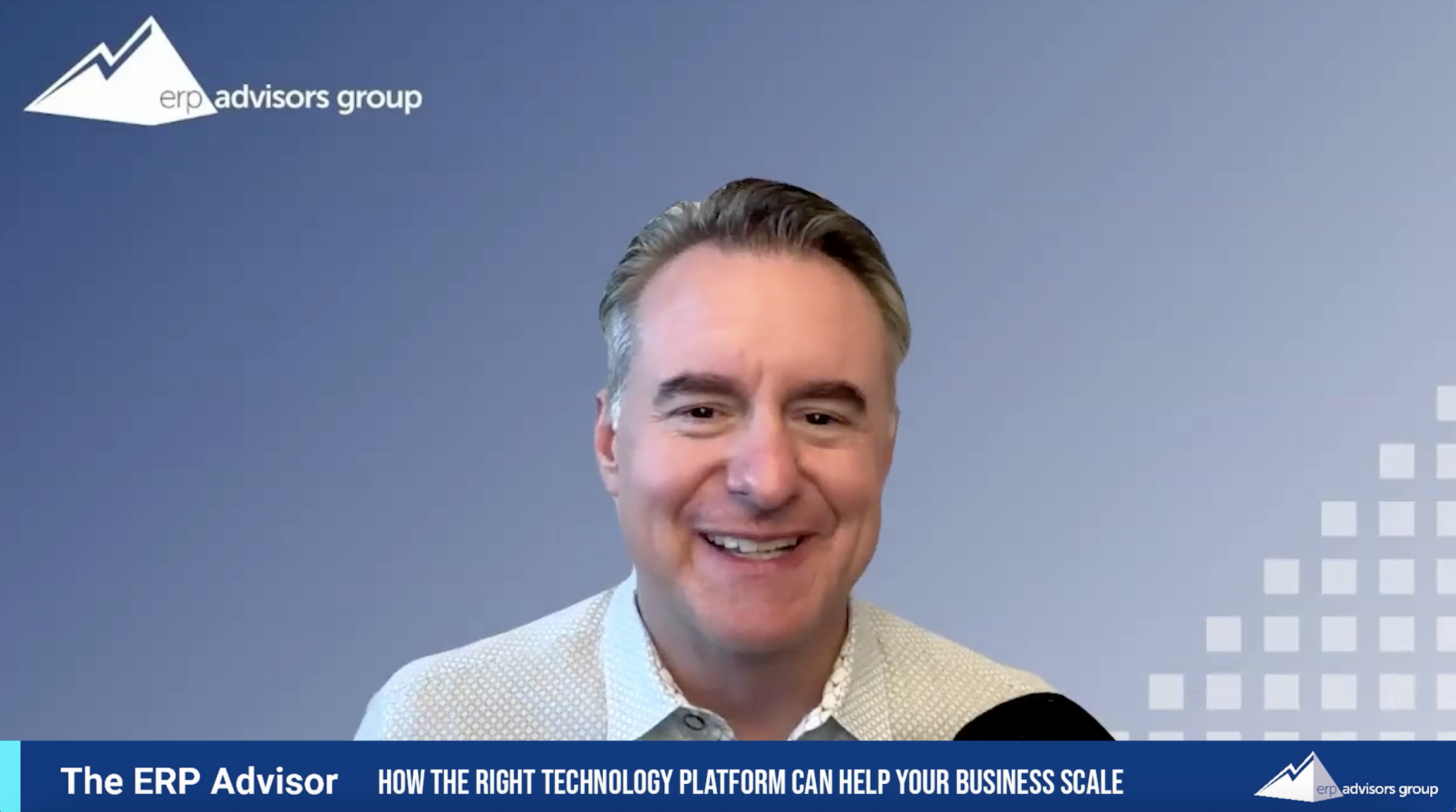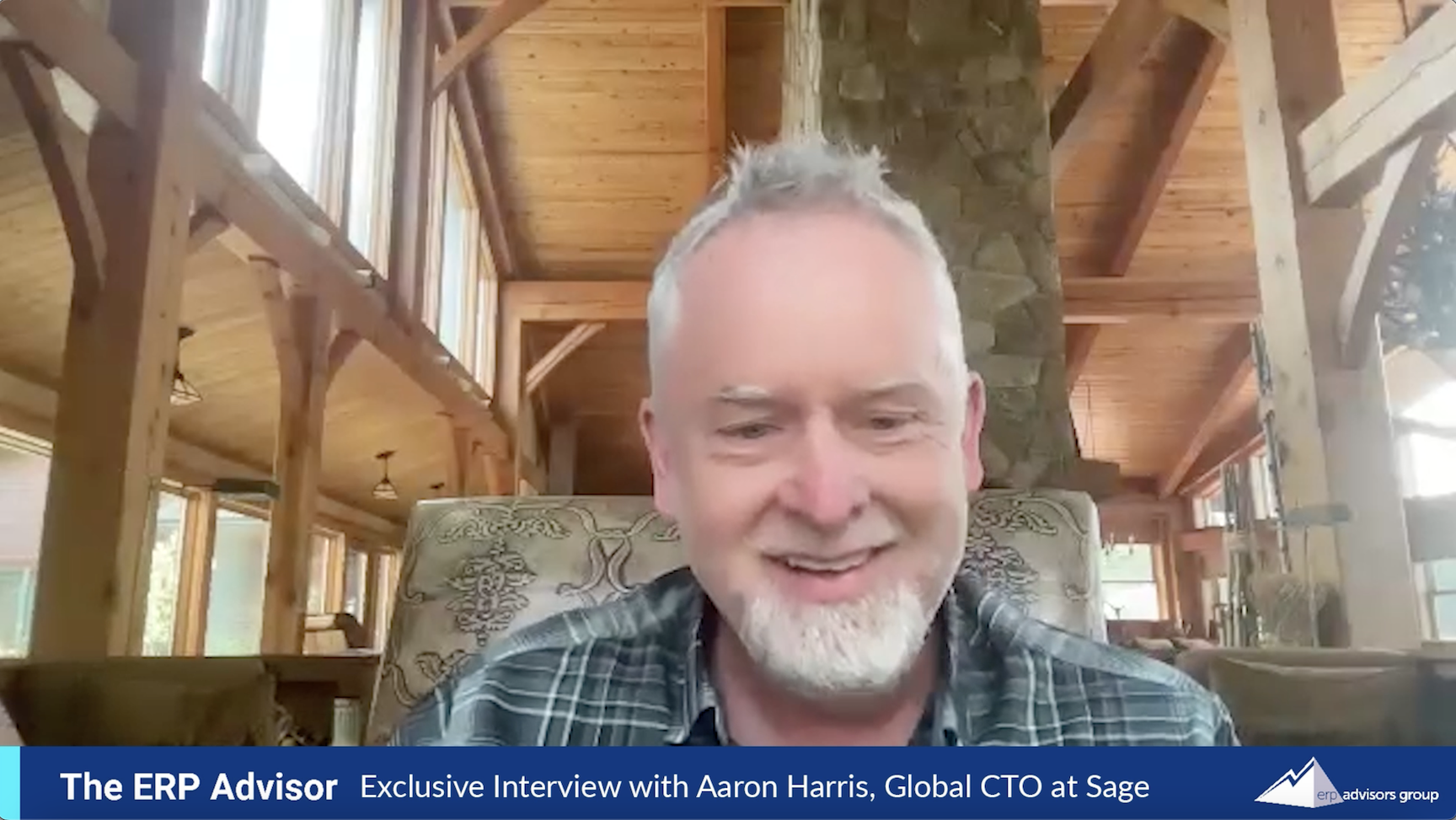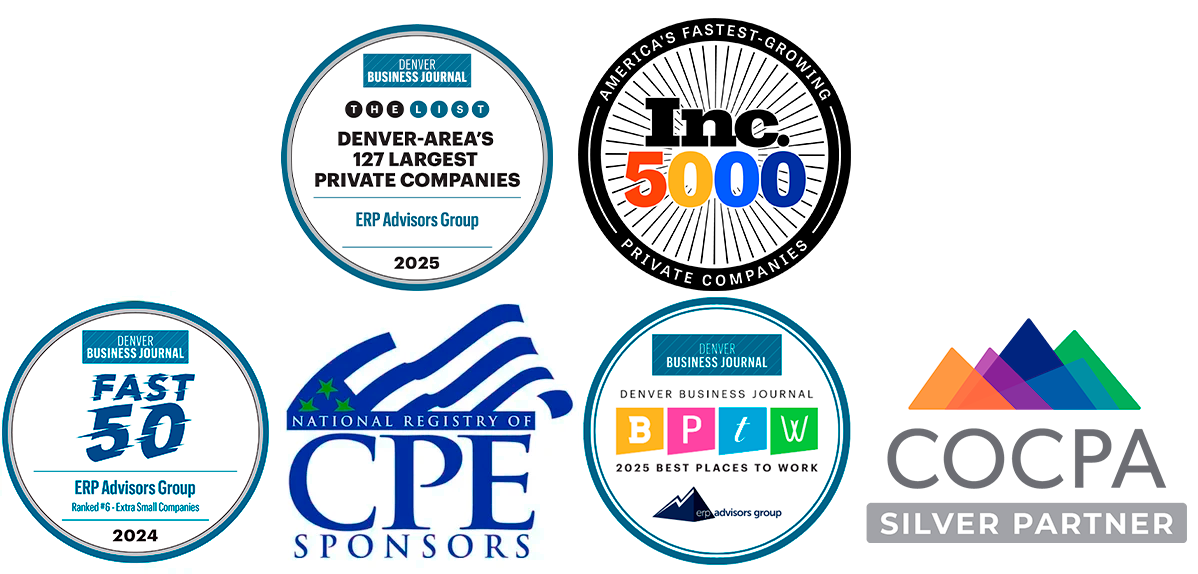Sage is one of the largest ERP vendors in the market, competing with the likes of Microsoft and SAP. Today, Sage has over 11,000 employees with customers in more than 20 countries. Its offerings span across HR, payroll, assets, enterprise systems, and more to help businesses grow. In this episode of The ERP Advisor, Shawn Windle provided a systematic run-through of Sage and how it could help your business.
Sage
Around a quarter of the employees in the United Kingdom earn their living working for Sage, demonstrating the significant scope they have in the market. With over 6.1 million customers across all of its products, it is clear to see the impact Sage has in the United Kingdom and around the world as one of the largest ERP companies in the world.
What Does Sage Sell?
Sage is a provider of Enterprise Resource Planning software for small to mid-sized businesses. Their main software focus is accounting but also includes CRM, MRP, ERP, and Fixed Assets options across their many applications.
Sage solutions are specialized for distributors, businesses needing core financials and financial management, and manufacturers. Sage solutions automate tedious tasks to increase business efficiency.
Intacct is Sage’s first pure Software-as-a-Service (SaaS), multi-tenant solution. The acquisition of Intacct is heavily aligned with the entire market’s shift to the Cloud. This addition allowed Sage to provide a more mobile and scalable solution than any of its previous solutions.
Sage X3 is Sage’s other primary ERP solution designed to put an organization’s entire business operations on a single enterprise management solution and database. Sage X3’s primary areas of focus lie in production, supply chain, and financial management. X3’s feature functionality expands to customer service and financial reporting across planning, manufacturing, quality control, and more.
Sage 50cloud is Sage’s flagship small business platform, providing an ERP platform alternative to QuickBooks. Sage 50 features accounting and financial functionality, enabling users to reduce administrative tasks and commit more time to value-added tasks.
Sage’s extensive line of legacy products boasts many users that still rely on Sage for platform support. Sage has committed time and effort for easy integration of solutions like Sage 90 (recently rebranded as Sage 100cloud), Sage 200, and Sage 300 to the cloud; however, obstacles are met as a result of these solutions not being built for the cloud. In all, many of these legacy solutions offer a multitude of application versions, with Sage 300 alone providing 19 variations.
Sage 500 is another staple Sage legacy product that is no longer implemented by Sage but is still supported. Sage 500 provides specific feature functionality for manufacturing, distribution and supply chain, and accounting and finance operations. Existing Sage 500 customers are provided with support through Sage Business Care for upgrades, support, training, and more. Through advancements in Sage 500, users can integrate additional applications to further advance operational needs.
What Kind of Partnership Ecosystem Does Sage Have?
Sage has a unique partnership ecosystem that includes Accountants, Bookkeepers, and Educators in addition to typical developers, Independent Software Vendors (ISVs), and Resellers.
Over the years, Sage has established a network of Bookkeepers and Accountants through their partnerships with AICPA and CPA.com to provide users with access to outsourced accounting services. Sage’s Intacct network boasts almost one-third of the top 100 accounting firms in the United States. Accounting professionals who are well-versed in Sage Intacct provide extra value to businesses because they can provide staff and software for running their clients’ financials and accounting functions.
Sage’s network of developers and ISVs provide solutions in the market outside of Sage’s direct product development and sell their solutions as modules for the Sage platform. This brings richer and more robust functionality to the Sage channel. We also see resellers acquire solutions to be used on the Sage platform that are not developed by Sage themselves.
Why Does Sage Win Over Their Competitors?
Sage Intacct is a clear winner when it comes to organizations that need a strong accounting system. Early on, Sage narrowed their focus to accounting offerings and has not strayed from that mission for 40 years. They are consistently working to improve these systems and offer the best product they can to users, making them a standout to many businesses looking to get into the world of ERP.
Another major reason Sage wins deals is because of its specific solutions, especially in the Nonprofit sector. Nonprofit specialization attracts users who need more from their software than just a generic Cloud or on-premises solution. Sage Business Cloud offers solutions to meet the needs of larger-scale nonprofits through global human resource tools and instant visibility across the company.
Sage X3 brings Sage to the forefront of competitive ERP deals for its ease of use, scalability, and cost-effectivity without sacrificing feature functionality. X3’s capabilities in financial, production, and supply chain management enable the software to grow as the business grows, reducing future friction and disruption. Potential users gravitate towards these Sage X3 features over other products on the market. X3 excels with meeting process manufacturer’s needs.
Conclusion
Sage’s offerings vary greatly in terms of functionality, price, and partnerships, depending on the solution your business is geared toward. From production management to accounting software solutions, Sage provides substantial value to businesses utilizing and implementing its systems.
Announcer 1: This is the ERP Advisor.
Announcer 2: The ERP Advisor’s overview of Sage.
Juliette: Everyone, thank you for joining us for our webinar today. This summer, ERP Advisors Group is spotlighting the most prominent vendors in the ERP software market. Today, we will be discussing Sage and its offerings and providing key insights into our experiences working with them. Shawn, thank you so much for joining me today.
Shawn: You bet, good to see you.
Juliette: Good to see you. Sage is one of the largest ERP vendors in the market. They're international with customers around the world, offices around the world. They compete with the likes of Microsoft and SAP, some of the other largest vendors. With that, can you talk to us a little bit about who Sage is and what they do?
Shawn: Sure. I think Sage has a pretty good brand name in North America. A lot of folks that call us are from around the world, but I would even say in Europe, I think Sage is better known than in North America.
Juliette: Oh, interesting.
Shawn: Yeah, Sage had some products, and they did a product change years ago, I don't remember when it was, but they moved from calling products, and the organizations have changed too. It's actually a pretty interesting story, that we’ll get into, but basically, you've got Sage as a solution provider that offers ERP for many different kinds of businesses, but mostly small to midsize, although they do have a product that scales up. So, you've got Sage 100, Sage 300, Sage 500, but then they also have X3, Sage X3 and of course, they also have Sage Intacct, which we'll talk about, which was a big acquisition they made several years ago. So, there’re a lot of different kinds of products that Sage offers for sure.
Juliette: So, with that, are there any specific industries they work more with than others or are they pretty much a universal ERP platform?
Shawn: You know, you're going to hear this a lot with Sage, which is it depends. And what it depends on are the specific products that we're talking about. So, you can sort of segment Sage into a couple of industries that they serve really well; they've got distributors. If you think about the distribution business, it's really hard because you've got all kinds of purchasing and procurement that you're doing. Sales and pricing and inventory management and finance, that's like a core industry, especially for organizations that are SMB, small, mid-size, or small medium-sized businesses.
Sage does a really, really nice job with those solutions and their Sage 100. Then they also have a pure cloud solution called Intacct, which I believe they purchased in just the last seven or eight years here. Intacct is a good application for core financials; it's very focused on financial management, so complex financials with multi companies, lots of different currencies, that kind of thing. That also has nice service functionality, project functionality in Sage Intacct as well as even some recurring billing for software companies.
So, that product fits there really well. They've also got a construction project that's a little bit more of a legacy product usually called Timberline Sage 300C. Then they have an old product called Sage 500, which is actually a really good manufacturing solution. And then Sage X3, which is also manufacturing but interestingly more on the process side, although it can do some other stuff too. We're actually looking at it for a food company right now, and I mean that really rounds out their main offering. So, again when we think about Sage, we always have to *voop* dive into which product, versus something like NetSuite where we think about it as just one product that has different sweet success modules to it. Sage, you have to think about these different kinds of organizations. So yeah, it's interesting, it's definitely an interesting product in that way.
Juliette: Yeah, what are some of the most prominent features for the different platforms in different industries that you've worked with?
Shawn: So, if we think about Intacct specifically, and I guess I should also say too, when we think about the functionality, they do have some HCM and CRM solutions. So, there are also those ancillary or adjacent products that they offer too.
But for a core solution, if we're talking to a software company that's easy, we're going to go to Intacct. That product can handle a lot of the billing, rev rec requirements, financial reporting requirements, you know really good; their service requirements handle really well in Intacct for sure. And then if we're going to a distributor or even a manufacturer, we're going to look at the Sage 100 product. That's what it's sort of targeted for and it's got pretty deep distribution functionality, but not super deep. It's not really meant to be for a billion-dollar distributor. It's more for early stage to a legacy distribution company that's maybe upwards of 50-100 million, maybe a little bigger, maybe a little smaller, but good distribution functionality. Then, like I mentioned on the X3 product, that's more of process manufacturing, more food functionality. So, you could go to Sage; I think Sage, I mean Infor has done this as well, but I think Sage has really done a good job of offering up a basket of different products to their legacy customers. Because when they made these acquisitions of these products over the years, they've been able to bring along a lot of customers.
There are a ton of customers in the market right now that run the mass 90, the mass 200 product, even MAS 500. And those products have kind of been sunsetted, there's some support for them like we've talked about. There's always some kind of support you can get whether it's to a partner or software vendor. But they're pushing customers to these newer products and there are thousands, 10s of thousands of customers in the world that are out here running these products. So, it's definitely a big customer base. I think per our note it’s 6.1 million customers in 24 countries. They've got a big reach, they've been in business for a long time, but you know, acquiring Intacct--it looks like in 2017--was a big deal for them, also because that's really the go-forward platform that we've seen from Sage and if anybody from Sage hears this and disagrees, tell us in a heartbeat. That's sort of what we're seeing if that makes sense.
Juliette: Yep, makes total sense. Let me ask you this, how customizable are the different Sage platforms or are they more of like an all-inclusive program, or is it like we discussed on another vendor, more of an ala carte type service program? Can you talk to us a little bit about that?
Shawn: You know their products are meant to be more used out-of-the-box for sure, but they can also be extended. So, if we look at for example Intacct, we've had some implementations where we've worked with Intacct and the implementation partners are able to build a lot of different things around that product, so it's definitely extendable for sure. I would say Sage 100 and some of the other products, are a little less customizable, but then you look at Sage X3 and it's very customizable. It's just each one of these is a different product set, it's like a different codebase. People as you are listening to this, your skill set may be expert, a lot of people aren't that way.
Juliette: Right, right, right.
Shawn: Many, many people in ERP aren't that way because it's so damn complex. I'm even like, “now what is Ajax? There's Ajax 3 again.” Like I have to constantly keep our team informed on what's going on with these products.
Juliette: That's right.
Shawn: I actually just met with the VP of marketing, that covers Ajax 3, and he gave me a sort of debrief on their road map, and I was blown away at what they're doing with that product. So, there's good stuff that Sage is putting into these solutions for firms which is a lot, but when you say Sage, you have to say, “what product?” otherwise it depends. It depends on what product you're talking about.
Juliette: Right, right, right. So, with that, can you talk to us a little bit about the pricing structure for Sage and the different platforms?
Shawn: Again, not getting into anything confidential, the Sage products are priced more on a typical basis, meaning you've got user pricing, you've got modules, or additional functionality pricing that equals an annual recurring amount that you'll pay every year as a subscription. The amount you pay every year covers things like support and maintenance for the product and makes sure you get the new upgrades and all that kind of stuff. So, I would definitely say it's a subscription-based pricing model, and within that very traditional based on the number of users and modules that you choose.
Juliette: Right. Well, let me ask you this, Shawn, from your experience working with Sage through the years and with a variety of different clients, why does Sage tend to win over their competitors?
Shawn: There're some really nice offerings that Sage has. Starting again with Intacct for like nonprofits, where they've got really good solutions around some of the capabilities that a nonprofit needs for a fund account. So that's core, and especially the big thing with Sage, again sticking on Intacct for a minute, is that they made the decision to say, “we're just going to do accounting and things related to accounting.” Other things like Salesforce CRM, time tracking, expense tracking, they may have a little bit of that capability, but they're really going to rely on partners for that. So, and again talking specifically on Intacct, even to the point where the AICPA--the American Institute of Certified Public Accountants--basically has a partnership, an endorsement of Intacct as a preferred accounting solution.
We don't know exactly what all that means if that's just paid or what that is. But it's important because it does go to show that Intacct is pitching as a really strong accounting system and one that plays really well with something like Salesforce. So that's a big reason why it wins is when a customer really needs that core accounting, it fits right in there; very effectively priced against its competition, for sure. The Sage 100 products win more on cost-effectiveness: pricing-wise against competitors it's pretty inexpensive. There are good partners, same for Intacct too, but there are good partners that have been selling Sage 100 for a long time. They know that solution and usually, those partners already have relationships with other customers because they've been working with those customers on their legacy products. Say *Jack St*, he does really well, like I said, in some of the more processed manufacturing industries where it's harder batch requirements.
Juliette: Mm-hmm, now let me ask you this, you touched on this briefly about the partnerships with Sage, what is the partnership ecosystem with Sage? Can you talk to us a little bit about that?
Shawn: Yeah, it's interesting because Sage, I think Sage has--I'm trying to look at my own experience here—the partners for Sage, again, which product. So, if we look at Intacct, I think we have a lot of accounting firms that decided, “hey, we're going to sell and implement Intacct to our accounting customers.” So, you've got really strong organizations that understand accounting principles that are implementing Sage Intacct accounting. and I love that. They know about accounting; they know the problems their customers are trying to solve with that product. But Sage Intacct, as we reported on the on the ERP Minute recently, is starting to offer a construction solution on Intacct, which is kind of interesting; so there you go, a pretty cost-effective solution.
I should also mention this about Intacct is it is a pure software as a service multi-tenant deployment, meaning when you buy Intacct you're really subscribing to the service, but it's architected in a way where it can easily be upgraded every year, and you're going to get that renewal of additional feature functionality no problem. So that's another reason why they win and why it's beneficial. I think the partners on the Sage 100 side, like I said earlier, these guys and gals know what they’re doing--I think I saw one notice recently on LinkedIn that one firm’s been in business for 40 years: that's a long time. He understands enterprise software, how to implement it, how to make you successful, and that's invaluable. So, you get a lot of that legacy experience, which is great. And then on the X3 side, you have firms that really understand the industry’s micro verticals and their requirements too because they've implemented for certain areas. We had a horticulturalist that grows perennials and annuals, basically a garden stock. They sell big boxes.
Juliette: They were the wholesaler, right?
Shawn: They're even before that, they're the nursers.
Juliette: OK.
Shawn: They're growing the plants. That's hard inventory management, because you're like, “oh, how many seeds do we have?” Well, that doesn't matter, what matters is how many seedlings and how many different levels of growth do we have in this specific plan. So, there is a partner out of North Carolina called Practical Solutions that built a really nice solution for horticulturists, and that's whom we used for the implementation, and did a great job for it. So, Sage X3 brings that kind of micro-vertical focus too.
Juliette: More specialized for sure.
Shawn: Yeah, yeah.
Juliette: Narrows it down.
Shawn: The partners make it more specialized, which is great.
Juliette: Yeah, so Shawn, again, from your experience working with a variety of clients and with Sage, are there any offerings that you'd like to see from Sage in the future?
Shawn: Ah, that's a good question. You know, the thing that I'm seeing is, and this is good to tell people because as you're evaluating software, you're going to need to differentiate these vendors quickly. For example, if you're a manufacturer and you have heavy inventory requirements, Sage purchased an application that does internet-based, company inventory management quite well. So, you sort of have to figure out what the solution looks like that’s best for you. I would say one of the things Sage could do, and you should look out for when you're evaluating Sage is to see whom you’re talking to. If you're talking to a partner that sells Sage 100, that's the hammer and everything is going to look like a sage 100 implementation, but maybe Intacct is right for you. No problem, a lot of those Sage 100 partners also sell Intacct now.
Juliette: OK.
Shawn: But if you have heavy, heavy inventory requirements, and even manufacturing, most of the partners are going to say, “you know what we can't do that,” or “we have these specialized tools that you have to bring out these independent software vendors that are writing solutions on them.” But if you talk to a Sage X3 partner about batch, like I said with the horticulturalists, they're going to be great. They're going to be able to answer that question. So, you just need to be careful and be aware like anybody else in the ERP market space because it's so dang complex.
Juliette: Right.
Shawn: Whom are you talking to? And you can simply ask them, “what do you really sell?” Just ask that question and the person is going to say, “oh, we sell solutions that change the world.” “Got it, but what do you really sell?” “Oh, we sell Sage 100.” “Oh, ok, and who uses that most frequently?” That's the next question. “Oh, that's distributors that are from 5 to 200 million.” Good, and then “why do you win over your competition?” So those three questions will give you enough understanding of what the offering is so that you'll be like, “ok, I finally understand what you do, and I should still call ERP Advisors because I'm still confused.” Maybe not, I hope not. I mean, this is why we put these videos out there so that people have more understanding. But again, if you're listening to this video, you're probably interested in Sage; I really do want you to just be aware that it depends when it comes to Sage because there are different products.
Juliette: That’s right, and from many of our other calls, the bottom line, knowing what your needs are, what your business is, and then those three questions, I mean that will get you a lot farther than most people, that's for sure.
Shawn: Right. I think that's actually right. We should have on our web page the three key questions. I could dress like someone old, like Moses, and have like a stone tablet.
Juliette: Right, right, right. Etched in stone.
Shawn: But definitely with Sage, keep those in mind. It’s a great firm; they have a lot of market capitalization. They're strong with a lot of R&D throughout the world, and a lot of customers throughout the world too. Good products for sure, but you just need to know exactly what we're saying, who are you talking to? What do they really offer? Why do they win over the competition? And you’ll be fine.
Juliette: That's right. Well, Shawn, thank you as always for joining me and sharing all your experience with us, it means a lot.
Shawn: You bet.
Juliette: Alright, well as we continue you and I will continue our vendor series this summer and we hope everyone else joins us. So be on the lookout for our limited multi-part series that will advance your ERP knowledge and allow you to take advantage of over a century of combined ERP experience from our expert consultants here at EAG. Thank you again for joining us today, bye, bye.
Announcer 2: This summer, ERP Advisors Group will be reviewing the most prominent ERP software vendors in the market. For more information about these vendors, please visit our website at erpadvisorsgroup.com. You can also find more EAG content by following us on social media or by subscribing to our podcast, The ERP Advisor.





